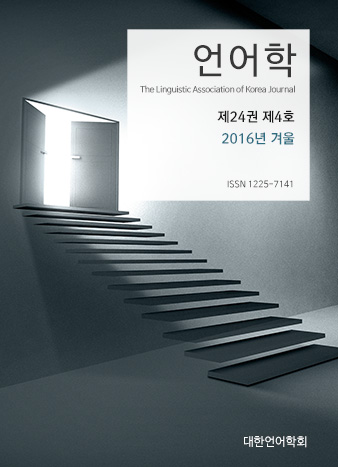대한언어학회 전자저널

-
An Alternative Approach to Realizations of the Medial [nt] Cluster in English
-
Boundary and pitch effects on the perception of Korean alveolar nasal
-
Corpus-Based English Grammar Instruction in a Korean College Context Korean College Context
-
A Study on the Relationship between Self-Efficacy Beliefs and Comprehension in English Reading
24권 4호 (2016년 12월)
Abstract
Keywords
# because절(because-clauses) # since절(since-clauses) # as절(as-clauses) # 독립절(independent clauses) # 주절(main clauses)
References
- 박태숙, 오치성. (2016). 한국 영어학습자들의 because 사용에 관한 모국어 전이 효과. 언어학 연구, 39, 121-139.
- Altenberg, B. (1984). Causal linking in spoken and written English. Studia Linguistica, 38(1), 20-69.
- Biber, D., S. Johansson, G. Leech, S. Conrad, & E. Finegan. (1999). Longman Grammar of Spoken and Written English. London: Longman.
- Diessel, H. (1996). Processing factors of pre- and postposed adverbial clauses. Berkeley Linguistics Society, 22, 71-82.
- Diessel, H. (2001). The ordering distribution of main and adverbial clauses: A typological study. Language, 77(2), 433-455.
- Diessel, H. (2005). Competing motivations for the ordering of main and adverbial clauses. Linguistics, 43(2), 449-470.
- Dancygier B. & Sweetser. E. (2000). Constructions with if, since and because: causality, epistemic stance, and clause order. In Elizabeth Couper-Kuhlen & Bernd Kortmann (eds.), Cause, Condition, Concession, Contrast. Cognitive and Discourse Perspectives (pp. 111-142). Berlin and New York: Mouton de Gruyter.
- Ford, C. E. (1993). Grammar in interaction. Adverbial clauses in American English Conversations. Cambridge: Cambridge University ress.
- Ford, C. E., & Thompson, S. A. (1986). Conditionals in discourse: a text-based study from English. In E. C. Traugott, A. ter Meulen, J. S. Reilly, and C. A. Ferguson (eds.), On conditionals (pp. 353-372). Cambridge: Cambridge University Press.
- Hawkins, J. A. (1990). A parsing theory of word order universals. Linguistic Inquiry, 21, 223-261.
- Hawkins, J. A. (1992). Syntactic weight and information status in word order variation. Linguistische Berichte (special issue 4), 196-219.
- Hawkins, J. A. (1994). A performance theory of order and constituency. Cambridge: Cambridge University Press.
- Hawkins, J. A. (1998). Some issues in a performance theory of word order. In Anna Siewierska (ed.), Constituent Order in the Languages of Europe (pp. 729-780). Berlin and New York: Mouton de Gruyter.
- Hawkins, J. A. (2000). The relative order of prepositional phrases in English: going beyond manner-place-time. Language Variation and Change, 11, 231-266.
- Kweon, S. O. (2008). A corpus-based analysis of the ordering of main and adverbial clauses in Korean learners of English. Korean Journal of Applied Linguistics, 24(1), 159-176.
- Oh, S. Y. (2009). Functions of because in native English and Korean learner corpora. Korean Journal of Applied Linguistics, 25(3), 443-470.
- Park, T. S. (2011). A corpus-based analysis of clause ordering in English complex sentences. The Jungang Journal of English Language and Literature, 53(3), 185-208.
- Quirk, Randolph, S. Greenbaum, G. Leech, & J. Svartvik. (1985). A grammar of contemporary English. London: Longman.
- Ramsay, V. (1987). The functional distribution of preposed and postposed “if” and “when” clauses in written discourse, In Tomlin, R.(ed.), Coherence and Grounding in Discourse (pp.383-408) Amsterdam: Benjamins.